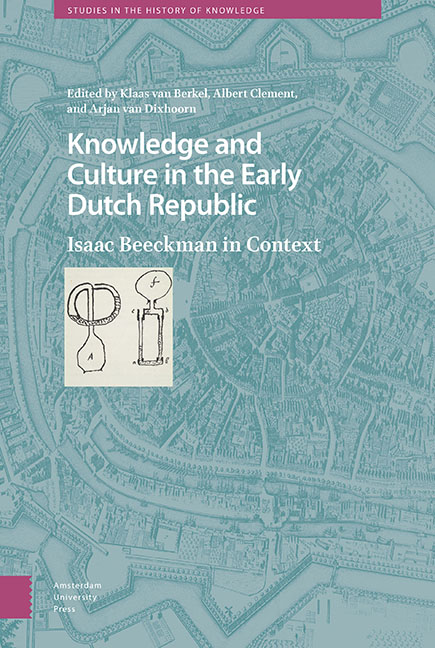2 - Isaac Beeckman in the Context of the Scientific Revolution
Published online by Cambridge University Press: 07 October 2022
Summary
Abstract
This chapter locates Beeckman in the most important, ‘critical’, phase of the Scientific Revolution, taken as a long process of several overlapping stages. His de novo invention of corpuscular-mechanical natural philosophy, a seminal event in that phase, offers a test case for analysing the contextual causes of this breakthrough. Beeckman's significance for the later stages of the process resided primarily in the little noticed Beeckmanian conceptual genes at the heart of Descartes’ mechanism – in his vortex celestial mechanics, the ‘engine room’ of his system and key to his radical Copernican realism. Finally, to illustrate that the experimentally oriented corpuscular-mechanism of indirect Beeckmanian origin was central to the next phase of the Scientific Revolution, a counterfactual scenario is offered concerning the work of a ‘Beeckman’ still alive in the 1660s.
Keywords: Isaac Beeckman, Scientific Revolution, corpuscular-mechanical philosophy, René Descartes, contextual explanation
Riding Orders: ‘What Was Beeckman Doing – in the Context of the Scientific Revolution?’
I have been concerned about Isaac Beeckman as a figure in the Scientific Revolution for just short of 50 years, having begun to read his Latin writings on mechanics in 1971, under the guidance of the late Michael S. Mahoney in the Princeton History of Science Program. Mahoney and I started terming the early mechanists such as Beeckman, Descartes, Hobbes and Gassendi, ‘corpuscular-mechanists’. Stimulated by another faculty member, Theodore K. Rabb, we began to think of the generation in which corpuscular-mechanical natural philosophy was invented as the critical stage in a multiphase process of the Scientific Revolution. Mahoney pointed out to me that in 1618 Beeckman had recalled the young Descartes to study, including the study of corpuscular-mechanical natural philosophy. Later, in my doctoral dissertation, the Beeckman/Descartes relationship covered 80 pages out of about 750.
However, I am not a fully-fledged Beeckman scholar. Believing in the importance of Beeckman in the Scientific Revolution and having a particular interest in his relations with Descartes, I have had a watching brief on Beeckman scholarship. When the organizers of the Middelburg Beeckman conference invited me to deliver a plenary lecture on the topic that is now the title of this chapter, I requested more guidance about my assignment. Klaas van Berkel asked me: ‘What do you think Beeckman was doing?’ My answer in the plenary talk and this chapter is that Beeckman was practising natural philosophy, in a novel register.
- Type
- Chapter
- Information
- Knowledge and Culture in the Early Dutch RepublicIsaac Beeckman in Context, pp. 31 - 50Publisher: Amsterdam University PressPrint publication year: 2022

